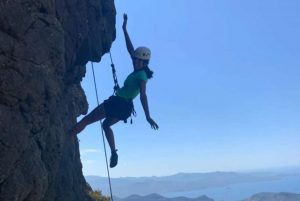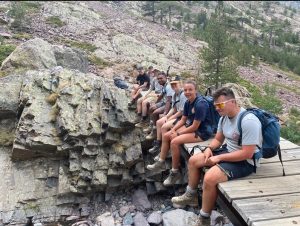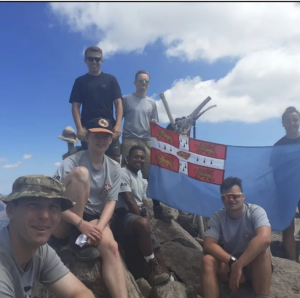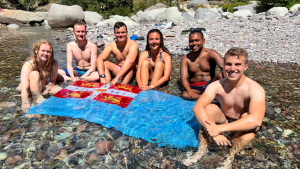Cambridge UOTC
We arrived at our campsite in Corsica after a long thirty hour journey. Everyone was tired and already struggling with the intense heat, but we got cracking with the work quickly. Kit needed unloading from the vans and all the tents had to be unpacked before anyone could even think about relaxing or going to the beach. In the 34 degree heat it was a big adjustment from back home, which was certainly one of our biggest challenges throughout the trip.
On the first full day of activities, we took the decision to gently ease into action to avoid heat injury, so after a breakfast of fresh pastries we split into our two teams of climbing and hiking groups and set off for the day.
Trekking
On the first day of activities the Trekking group went to the coast of the island for a short trek while we acclimatised. The route took around four hours after which we stopped at a cafe for a refreshing drink and then went back to the campsite to help cook dinner. Throughout the course of the next ten days we progressively pushed ourselves harder and harder, hiking further and to higher altitudes each time.
By far the highlight of the trip was when we climbed Monte Cinto, the highest peak on the island. We started out by leaving the afternoon before to drive to a mountain refuge where we were to spend the night, stopping on the way to swim in a beautiful lagoon that lay on the route.
Once we got to the refuge we spent the evening getting ready for the next day’s adventure and resting up. We set off at 5am the following day in an effort to avoid the worst of the heat, although it was already incredibly warm by this point. The route initially took us through several kilometres of upward sloping forest however this quickly gave way to an incredible view over rocky slopes and distant peaks. At this point the journey rapidly became much more technically difficult as we had to essentially scramble up several hundred metres of rock slopes, which provided an exciting challenge for those of us used to trekking on the much easier slopes of England. It was very intense, especially as the heat started to set in and we had to make sure to pace ourselves so we could keep plodding up the steep shale covered areas of the mountain. It was incredibly rewarding to eventually reach the top, especially as several of us had started to wonder if we were capable of making it up, and it was only through sheer grit and determination that we managed to get to the summit. After a short stop to enjoy the incredible views and rehydrate ourselves, we then began the long trek down the mountain, satisfied that we had really pushed ourselves to the limit.
This wasn’t the last mountain we climbed while we were there, although it was certainly the highest. Several days later we decided to climb Paglia Orba, a peak of 2525m which again provided us with a real challenge that was incredibly rewarding to complete. This time we came across several small but picturesque lagoons that were an excellent place to paddle our aching feet on the way back down.
For the remainder of the trip the Trekking group swapped to try our hand at climbing, something most of us were relatively inexperienced at, and this proved to be incredible enjoyable as well as educational, as we started to cover the basics of knot tying and harness making techniques. The biggest challenge in climbing was finding walls that weren’t too exposed, as the relentless sun would lead to most walls being too hot to the touch by 11am. It was unfortunate to have the climbing cut short by this issue, but we made the most of it by being as efficient as possible so that every member of the group got turns at climbing each crag, and it was a valuable lesson in planning ahead to make sure we left early enough in the morning to beat the sun.
Overall our trip to Corsica was incredibly enjoyable and fulfilling, and we all really felt like we had pushed ourselves to our limit, as well as learning lots about how to plan future expeditions and overcome challenges.
Rock Climbing
The first day after arriving in Corsica the climbing group split into two and each group went on a recce of a possible crag to assess them for suitability. The two crags we explored were Monte Cararincu and Serra Pignu and we checked quality and number of bolts, the accessibility of the approach and what climbing gear we would be able to take with us and what direction they were facing in which allowed us to work out when they would be in full sun and if there would be any shade at the bottom of the crag.
After our recce the day before we decided to visit Monte Cararincu on the first day climbing, as had multiple climbs the majority of which were a lower grade than Serra Pignu so a good location for the first day. The group consisted of mixed abilities: 2 members had completed both there climbing foundation and competent second award, 3 members had previous experience climbing and there was one beginner. Therefore, initially we refreshed/were taught how to tie into a rope and the names and basics of pieces of equipment such as quick draws and carabiniers. Throughout the course of the day, we each attempted 6 climbs varying in difficult from 4a-5c.
On the second day we went to the other location we recced Serra Pignu and split into two groups and went to either end of the crag. One group completed some shorter climbs graded at 4a and 5c whilst the other group attempted a longer more challenging 6a climb which required strong grip strength to ascend the middle section of the slab.
Throughout the week we visited multiple other locations such as Ilsula Rossa and Tipponu-a crag not listed in the guidebook but one which we found when looking for a suitable area to be taught skills about placing equipment for trad climbing. We attempted climbs ranging from 3c to 7a and returned.
We presented with a challenge at Ilula Rossa as the crag was in full sun and there was little shade available, as well as creating an uncomfortable environment it also caused the rocks to heat up, making climbing more difficult. This meant we had to adjust our expectations of what was possible and ensure we were sensible by taking regular breaks and drinking lots of water. This highlighted how plans have to be adjustable depending on the specific conditions and helped to reinforce the important fact that safety should be prioritised over everything. After this experience we wanted to return to this particular crag to do some of the other climbs there, so we camped on the crag overnight allowing us to begin climbing as soon as the sun came up when it was slightly cooler.
Belaying can often be an uncomfortable experience due to straining you neck but was made even more so by the sun beating down relentlessly on your back. Knowing you had to continue despite the discomfort improved our resilience and ability to focus on a task in challenging conditions. In addition, we worked on our teamwork as you need to trust fully in your partner and communication is absolutely vital between the two entities.
We also had to display perseverance whilst up the rock face. One particular tricky overhang comes to mind at Serra Pignu. No one managed to get to the top bolt although multiple people had numerous attempts trying different routes and making improvements on their previous attempts showing determination despite having aching arms and being fatigued.
On the second day around half the group managed to make it to the top bolt of the 6a however by the end of the week the whole group were climbing at that level, demonstrating the development of skills. As well as developing our climbing skills we also had lessons on rigging a top rope and placing gear for trad climbing. Armed with this knowledge towards the end of the week we were able to complete some dummy leads, improving our confidence and giving us a sense of what is required for lead climbing and the skills we need to develop further.
Throughout the week we gained confidence by having to focus in stressful situations. It taught us how by moving only a couple of inches higher offers up a multitude of different possible foot and hand holds, highlighting that making a seemingly tiny amount of progress can make it possible to achieve things you didn’t think you could. Many of us have been inspired to take climbing further and get our next qualifications-one of us has already booked onto the Rock Climbing Supervisors course.
Quotes from Officer Cadets
“Adventure training is vital to developing oneself whether its being constantly surrounded by new people and cultures or the strenuous learning environment that really pushes one’s ability to learn practically in the moment. This adventurous training expedition to Corsica did not disappoint as it provided advanced rigorous training in difficult conditions and pushed us to our limits. Not only could we advance our climbing skills beyond what we thought was possible, we were able to develop our personal resilience and skills enabling us to achieve.”
Officer Cadet
“During our adventurous training expedition to Corsica, I partook in the Mountaineering element, exploring the coastlines and mountains of the country. This built up to us completing a section of the GR20, and the summit of Monte Cinto peaking at 2706m. The training and expeditions taught me how to structure a plan to the ability of the group and the significance of thorough preparation. Adventurous training is important as it develops trust and cohesion within a team and brings people with different experiences and skill sets together to complete the expeditions aim.”
Officer Cadet
“The Corsica Expedition was a great chance to further develop skills that I had practiced on previous trips such as to Chamonix and Calpe. The small group size allowed for greater technical climbing development and a huge amount of time on the rock. This trip hugely improved cadet knowledge of grading and our ability to undertake arduous adventurous training in hotter climates.”
Officer Cadet
“This Adventurous training package to Corsica allowed me to participate in multipitch climbing and use my competent second qualification that I gained when climbing in Chamonix. My climbing developed massively, we focused on technique throughout this trip and through amazing instruction and teaching I learnt so much about climbing, and my technique improved dramatically. I’d like to thank the Ulysses trust for giving me the opportunity to go to Corsica as it has given me confidence in my climbing ability and because of this trip I am now going on a Rock Climbing Supervisors course at the end of September.”
Officer Cadet






